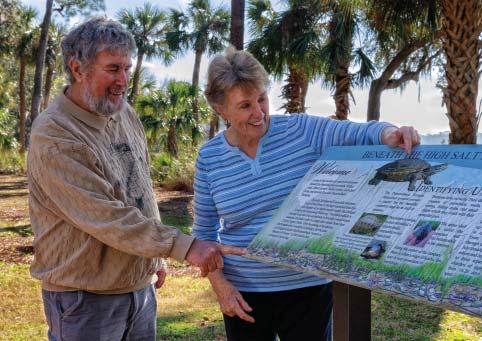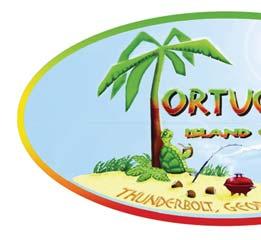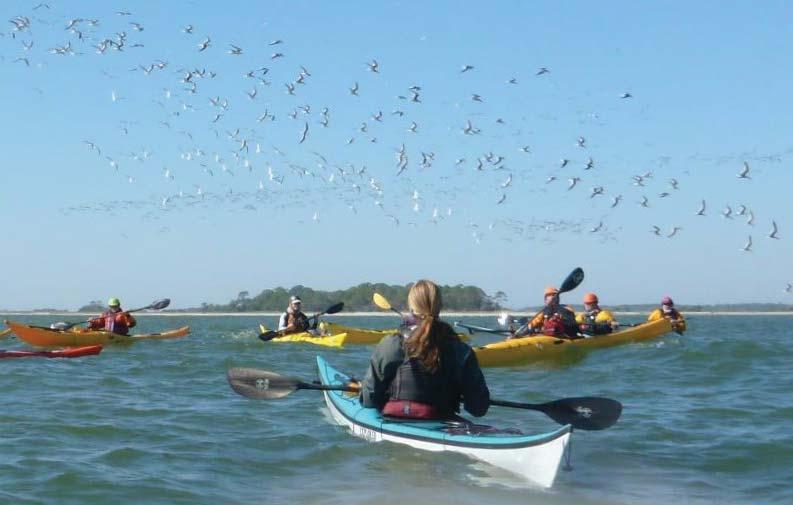
6 minute read
6 Community Updates
Wildlife Viewing Grants Awarded
The GADNR Wildlife Resources Division announced recently that six projects have been selected as 2018 recipients in the agency’s Wildlife Viewing Grants Program.
Advertisement
Funded by the Georgia Nongame Wildlife Conservation Fund and the Georgia Natural Resources Foundation, the grants are aimed at helping develop and enhance viewing options that increase awareness of wildlife, with an emphasis on Wildlife Action Plan species and habitats. Georgia’s Wildlife Action Plan is a comprehensive strategy to conserve these creatures and places before they become rarer and costlier to conserve or restore.
This year’s recipients, chosen from more than 20 applicants, are: • Athens-Clarke County: $2,823 for bat boxes and signage on the Oconee Rivers Greenway as part of larger bat-awareness project. • One Hundred Miles: $2,865 for extensive outreach encouraging responsible wildlife viewing on St. Simons-area beaches. • Golden Triangle Resource Conservation and Development Council: $2,750 for kiosks featuring rare species information along a Spring Creek boardwalk in Colquitt. • The Amphibian Foundation: $2,628 for signs interpreting rare salamander propagation at an Atlanta park, the foundation’s home base. • Okefenokee Swamp Park: $2,163 to build a wildlife viewing platform at the Waycross park. • Coastal Georgia Audubon: $1,773 to design and add interpretive signs highlighting shorebird habitat at key viewing sites along the state’s coast.
Although the grants are small, the interest they tap is big. According to a U.S. Fish and Wildlife Service survey, about 2.4 million people took part in wildlife-viewing activities in Georgia in 2011. The survey estimated related spending at $1.8 billion.
$1.1 Billion in Funding for Outdoor Recreation
U.S. Secretary of the Interior Ryan Zinke recently announced more than $1.1 billion in annual national funding for state wildlife agencies from revenues generated by the Pittman-Robertson Wildlife Restoration and Dingell-Johnson Sport Fish Restoration (PRDJ) acts.
To date, the U.S. Fish and Wildlife Service has distributed more than $20.2 billion in apportionments for state conservation and recreation projects. Allocations of the funds are authorized by Congress.
“Every time a fi rearm, fi shing pole, hook, bullet, motor boat or boat fuel is sold, part of that cost goes to fund conservation. The best way to increase funding for conservation and sportsmen access is to increase the number of hunters and anglers in our woods and waters. The American conservation model has been replicated all over the world because it works," said Secretary Zinke.
These funds support critical state conservation and outdoor recreation projects. They are derived from excise taxes paid by the hunting, shooting, boating and angling industries on fi rearms, bows and ammunition and sport fi shing tackle, some boat engines, and small engine fuel.
Georgia hunters contribute to a $1.6 billion eff ect in yearly economic impact. Angling creates an economic impact to the tune of $2.1 billion each year. Together, hunting and fi shing support almost 40,000 jobs in the state.
For more information visit wsfrprograms.fws.gov/
Skidaway Island Georgia's First Certifi ed Sustainable Community
With help from UGA Marine Extension and Georgia Sea Grant, The Landings community on Skidaway Island was recently designated by Audubon International as the fi rst Certifi ed Sustainable Community in Georgia. In 2013 by members of Skidaway Audubon who established a Sustainable Skidaway steering committee made up of residents and staff in The Landings, as well as representatives from other entities on the island, including Skidaway Island State Park and UGA Marine Extension and Georgia Sea Grant. For the last fi ve years, the committee has led the eff ort to become a Certifi ed Sustainable Community. The long-term sustainability plan approved by Audubon International has over 15 focus areas, including economic development, housing, environment, resource use, agriculture, education and open space, among many others. To receive certifi cation, communities must implement projects in each of these areas that benefi t community residents and visitors as well as the natural environment. Anne Lindsay, associate director of marine education at the UGA Marine Education Center and Aquarium on Skidaway Island serves on the committee and has been involved in a number of education and outreach projects that helped move the community forward in its John "Crawfi sh" Crawford and Carolyn McInerney stand near an educational sign designation. One such project was to create and install interpretive about the Skidaway Island Diamondback Terrapin Hatchery Project. signs about historic and natural sites on the island, designed to give Photo provided by UGA Marine Extension and Georgia Sea Grant residents a deeper understanding of where they live. Another long-term project, in the environment category, is the Skidaway Island Diamondback Terrapin Hatchery Project, overseen by Marine Extension and Georgia Sea Grant Naturalist John “Crawfi sh” Crawford. Crawford holds a DNR Scientifi c Collection Permit, which allows volunteers in the community to retrieve terrapin nests from golf courses, so they aren’t destroyed by predators or machinery. The eggs are transferred to nesting boxes located near the marsh, allowing hatchlings to be released into their natural habitat.
Two of the 15 inshore manmade reefs along Georgia’s coast have recently been enhanced with additional materials, in the form of concrete rubble donated by the City of Brunswick.
The Henry Vassa Cate reef, formerly known as Twin Sisters Reef, is located in St. Simons Sound (31°09.973’N / 81°42.899’W). Established in 1987, it is marked with concrete pilings installed in 2015 in partnership between the DNR Coastal Resources Division (CRD) and the Coastal Conservation Association (CCA) of Georgia.
The second enhancement was to the Jekyll Island pier reef, behind the west arm of the pier (31°07.023'N / 81°25.106'W). This reef provides fi shing opportunities accessible by land for coastal residents and tourists.
The new materials deployed at these sites will become colonized with barnacles, oysters, and other marine life creating shelter and feeding opportunities for small invertebrates and fi shes that attract sheepshead, spotted seatrout, and red drum, which are popular with recreational anglers.
Both projects were funded by the 2017 Enhanced Fishing License Revenue bill passed by the Georgia Legislation. Other enhancement projects for both inshore and off shore reefs are planned during 2018 and 2019.
SkIO Researcher Receives Prestigious Fellowship
University of Georgia Skidaway Institute of Oceanography (SkIO) scientist Julia Diaz has been awarded a prestigious Sloan Research Fellowship. Diaz is joined by 125 other 2018 Sloan Fellows from across the U.S. and Canada.
Presented by the Alfred P. Sloan Foundation, the fellowship is awarded to early-career scholars representing the most promising scientifi c researchers working in the fi elds of chemistry, computational or evolutionary molecular biology, computer science, economics, mathematics, neuroscience, ocean sciences, physics or a related fi eld. Since 1955, Sloan Research Fellows have gone on to win 45 Nobel Prizes.
Diaz will receive $65,000, which may be spent on any expense supportive of her research, which is focused on how the chemistry and microbiology of the oceans shape each other and ultimately how this interaction aff ects ecosystem health from local to global scales.
Diaz graduated from the University of Georgia with a Bachelor of Science in biology and went on to earn her doctorate in earth and atmospheric sciences from Georgia Tech. She conducted postdoctoral research at Harvard University and the Woods Hole Oceanographic Institution.
Presented by the Georgia DNR and Chatham County Marine Patrol
This is a Georgia approved class, required for anyone born after January 1, 1998 to operate any vessel on Georgia waters. The course is instructed by CCMP and GA DNR Resource Rangers. It covers all required equipment and Georgia boating laws. All students must pass an exam and provide their social security number to receive the ID card.
3rd Saturday every month Must register at www.gooutdoorsgeorgia.com
Savannah Mall Community Meeting Room 9:00 a.m. - 4:00 p.m. (912) 264-7237
sea kayak georgia

Southern food with Caribbean flair, prepared with fresh local ingredients! repared with fresh local ingredient
Kayak, SUP, & Canoe Tours

Instruction Group Educational Tours Sales
1102 Highway 80, Tybee Island 912-786-8732
seakayakgeorgia.com info@seakayakgeorgia.com









